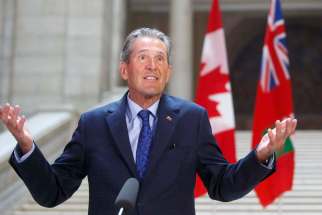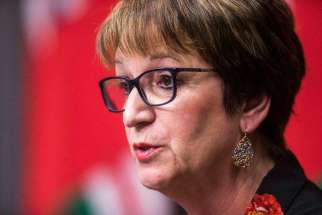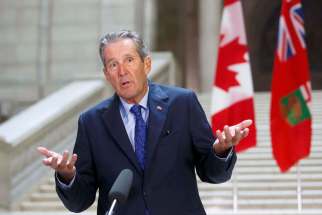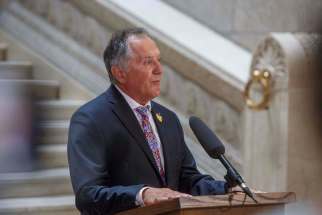A rather inauspicious ministerial debut
Read this article for free:
or
Already have an account? Log in here »
To continue reading, please subscribe:
Monthly Digital Subscription
$0 for the first 4 weeks*
- Enjoy unlimited reading on winnipegfreepress.com
- Read the E-Edition, our digital replica newspaper
- Access News Break, our award-winning app
- Play interactive puzzles
*No charge for 4 weeks then price increases to the regular rate of $19.00 plus GST every four weeks. Offer available to new and qualified returning subscribers only. Cancel any time.
Monthly Digital Subscription
$4.75/week*
- Enjoy unlimited reading on winnipegfreepress.com
- Read the E-Edition, our digital replica newspaper
- Access News Break, our award-winning app
- Play interactive puzzles
*Billed as $19 plus GST every four weeks. Cancel any time.
To continue reading, please subscribe:
Add Free Press access to your Brandon Sun subscription for only an additional
$1 for the first 4 weeks*
*Your next subscription payment will increase by $1.00 and you will be charged $16.99 plus GST for four weeks. After four weeks, your payment will increase to $23.99 plus GST every four weeks.
Read unlimited articles for free today:
or
Already have an account? Log in here »
Hey there, time traveller!
This article was published 16/07/2021 (1605 days ago), so information in it may no longer be current.
It is quite likely that Alan Lagimodiere, Manitoba’s newly appointed minister of Indigenous reconciliation and northern relations, had never heard of the term “honorary witness” before this week. You can be sure he is familiar with it now.
Moments after being unveiled as a new minister on Thursday, Mr. Lagimodiere responded to a question about residential schools by describing them as places where Indigenous children could go to gain “skills and abilities” they needed to join Canadian society. “At the time, they really thought they were doing the right thing,” he said of the people who ran the schools.
Immediately after that comment, Mr. Lagimodiere was interrupted by NDP Leader Wab Kinew, who was present for the minister’s inaugural news conference.
Mr. Kinew is not just a political opponent; he is also an “honorary witness” as designated by the Truth and Reconciliation Commission of Canada, which provided Canadians with the definitive history of the residential-schools experience. Honorary witnesses make a lifetime commitment to “store and care for the history” of residential schools. Many honorary witnesses — which include prominent Indigenous and non-Indigenous Canadians alike — have taken up the challenge to speak out against revisionist or denialist interpretations of that history, such as the one offered by Mr. Lagimodiere.
Notwithstanding the horrifying stories of death, disease and abuse revealed in the TRC report, many have tried to portray residential schools as a good idea gone bad. Or, to claim the violence and abuse documented by survivors was the result of a few “bad apples.” Mr. Kinew rightly reminded the new minister the expressed intent of residential schools was “to kill the Indian in the child,” and there is little debate now — particularly in light of recent revelations of unmarked graves of hundreds of former students — the stewards of the schools often embraced both the figurative and literal implications of that phrase.
“You can’t be out here defending residential schools if you want to work with Indigenous communities,” Mr. Kinew said.
What Mr. Lagimodiere offered, mere minutes into his new post, was an all-too-familiar denialist rationalization applied to one of the most woeful chapters in Canadian history. The new minister has no good excuse for not knowing more about residential schools, and not recognizing that his statements would be seen as deeply offensive.
To be fair, Mr. Lagimodiere’s ill-advised comments were reflective of a government and a first minister that seem never to have fully embraced the truth of residential schools or the reality of life in Canada for Indigenous people.

Manitobans were reminded of that recently when Mr. Lagimodiere’s boss, Premier Brian Pallister, suggested colonial settlers came here to “build” a new life, and “didn’t come here to destroy anything.” Despite being soundly denounced for this assertion, which ignores the brutal reality of colonialism, Mr. Pallister has refused to apologize and continues to argue, against all evidence to the contrary, that he has been an ally in reconciliation.
Mr. Lagimodiere issued a tweet shortly after the ill-fated media conference, saying he “misspoke” and acknowledging that residential schools sought to “eradicate Indigenous culture.” But the statement with which he introduced himself as minister of Indigenous reconciliation will likely be remembered as in keeping with the Pallister government’s tortured logic on Indigenous issues.
Mr. Lagimodiere may never recover from his ministerial debut. But it seems likely his position in cabinet will be secure as long as he echoes his boss’s thinking on Indigenous issues.
Based on his performance on his first day on the job, Mr. Lagimodiere appears quite capable of that.















